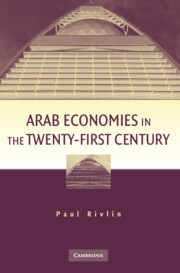Crossref Citations
This Book has been
cited by the following publications. This list is generated based on data provided by Crossref.
Said, Mona
2012.
Wage Differentials During Economic Reform and Crisis: Evidence from Egypt and Jordan.
Comparative Economic Studies,
Vol. 54,
Issue. 1,
p.
65.
Mazaheri, Nimah
2013.
The Saudi monarchy and economic familism in an era of business environment reforms.
Business and Politics,
Vol. 15,
Issue. 3,
p.
295.
Hammond, Keith P.
2015.
Global Perspectives on Adult Education and Learning Policy.
p.
119.
Zurayk, Rami
2016.
Development Challenges and Solutions after the Arab Spring.
p.
139.
Forster, Nick
2018.
Why are there so few world-class universities in the Middle East and North Africa?.
Journal of Further and Higher Education,
Vol. 42,
Issue. 8,
p.
1025.
Benner, Maximilian
2019.
Industrial Policy in the EU and Its Neighbourhood: Learning from Policy Experimentation.
Economies,
Vol. 7,
Issue. 2,
p.
44.
Benner, Maximilian
2020.
A New Arab Social Contract?.
p.
35.
Benner, Maximilian
2020.
A New Arab Social Contract?.
p.
9.
Benner, Maximilian
2020.
A New Arab Social Contract?.
p.
91.
Benner, Maximilian
2020.
A New Arab Social Contract?.
p.
167.
El-Haddad, Amirah
2020.
Picking Winners: Identifying Leading Sectors for Egypt and Tunisia Using the Product Space Methodology.
Review of Middle East Economics and Finance,
Vol. 16,
Issue. 1,
Hvidt, Martin
2021.
When Can Oil Economies Be Deemed Sustainable?.
p.
281.
Elsayed, Dina
2021.
Corruption in the MENA Region.
p.
61.
Oumazzane, Tarik
2021.
Regional Integration in the Middle East and North Africa.
p.
61.
Görmüş, Evrim
and
Akçalı, Emel
2021.
Variegated forms of embeddedness: home-grown neoliberal authoritarianism in Tunisia under Ben Ali.
Journal of International Relations and Development,
Vol. 24,
Issue. 2,
p.
408.
Maier, Anna-Lena
2021.
Political corporate social responsibility in authoritarian contexts.
Journal of International Business Policy,
Vol. 4,
Issue. 4,
p.
476.





